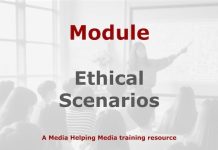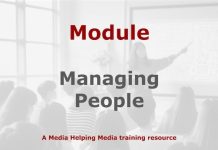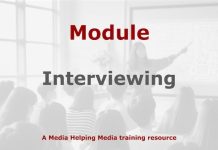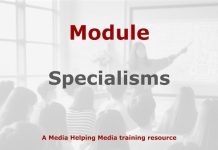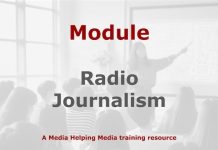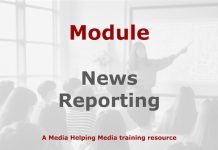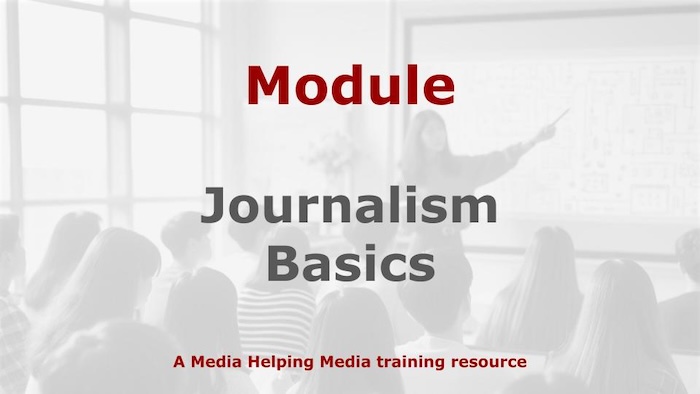 This module is designed for newcomers to journalism as well as those who want to refresh their understanding of the core principles that underpin good reporting. It can be taught as a standalone session or adapted as a foundation for more advanced modules.
This module is designed for newcomers to journalism as well as those who want to refresh their understanding of the core principles that underpin good reporting. It can be taught as a standalone session or adapted as a foundation for more advanced modules.
The focus is on building skills and values that ensure journalism is accurate, honest, impartial and fair, while serving the public with essential, engaging and trustworthy information. Please feel free to adapt and rework the following material for your own purposes.
Journalism basic: The importance of getting it right
Level: Undergraduate or early-career journalist training
Duration: 6 Weeks
Delivery: Weekly sessions (2–3 hours per week) plus guided reading and assignments
Week 1: Accuracy – The journalist’s first duty
Accuracy is the first duty of a journalist. Every detail of a report – names, dates, figures, quotes, and context – must be checked and verified before publication. Even a small mistake can undermine credibility and damage the trust between journalist and audience. Accuracy also means avoiding assumptions, cross-checking information from multiple reliable sources, and correcting errors promptly and transparently when they occur.
- Learning outcomes:
- Understand the paramount importance of accuracy in maintaining public trust.
- Develop systematic verification techniques for all types of information.
- Recognise the need for prompt and transparent correction of errors.
- Reading resources:
- Activities:
- Verification drill: Students correct deliberate errors in a sample news brief using prepared source files or online searches.
- Source assessment: Discussion on judging the reliability of different source types (e.g., official documents versus social media).
- Fact-check review: Students analyse published news stories and identify facts requiring independent verification.
Week 2: News writing and structure
Clear, concise writing is at the heart of effective journalism. Journalists should use plain, accessible language, avoiding jargon, clichés, and overly complex phrasing. A news story should be engaging but not exaggerated; it should balance clarity with depth so that readers or viewers come away informed rather than confused. Structure also matters – important facts should come first, followed by supporting context, enabling audiences to grasp the essential message quickly.
- Learning outcomes:
- Master the principles of clear, concise, and accessible news language.
- Identify and eliminate common pitfalls in journalistic language (jargon, clichés).
- Apply the ‘clarity is as important as accuracy’ principle to reportage.
- Reading resources:
- Activities:
- The inverted pyramid: Workshop on structuring a news story, focusing on placing the most important facts first.
- Clarity challenge: Students rewrite a piece of technical writing into accessible, plain English news copy.
- Critique session: Review published articles for examples of jargon or clichés and suggest simpler alternatives.
Week 3: Recognising and shaping a story
Strong journalism starts with a sharp news sense – the ability to spot what is new, interesting, and relevant to the public. A good journalist is constantly alert to developments and understands how to distinguish between routine events and significant stories. Recognising a story also involves identifying why it matters, who is affected, and what larger trends or issues it connects to. Originality in finding and shaping stories strengthens the role of journalism as a vital public resource.
- Learning outcomes:
- Cultivate a ‘news sense’—the ability to spot newsworthy developments.
- Differentiate between routine events and significant public interest stories.
- Understand how to identify a story’s significance, audience, and broader connections.
- Reading resources:
- Activities:
- News radar exercise: Students pitch three potential stories from recent news, justifying their choice based on news values.
- Story shaping: Brainstorming different angles for a simple event to find an original, relevant story.
- The ‘why it matters’ test: Articulating the public value of each pitched story in two sentences or less.
Week 4: Impartiality and fairness
Impartiality means presenting information in a way that is free of personal opinion, political bias, or undue influence. Journalists should strive to include diverse perspectives, avoid loaded language, and treat viewpoints fairly. Remaining impartial does not mean avoiding difficult issues, but instead reporting them with balance and transparency so that audiences can form their own informed decisions.
Fairness is about treating people, institutions, and stories with dignity and openness. This requires verifying claims, offering a right of reply when appropriate, and avoiding sensationalism or selective reporting that distorts reality. Fair journalism shows respect for differing perspectives and avoids exploiting vulnerable people for impact or profit. At its core, fairness ensures that journalism builds trust with both sources and audiences.
- Learning outcomes:
- Define and apply the core concepts of impartiality and balance in reporting.
- Implement techniques for ensuring a story includes diverse and relevant perspectives.
- Recognise the need for fairness, avoiding sensationalism and offering a right of reply.
- Reading resources:
- Activities:
- Loaded language audit: Identifying and replacing emotionally charged words with neutral, impartial language in sample text.
- Role-playing scenario: Practising interviewing different stakeholders on a contentious topic to ensure balance and avoid personal bias.
- Right of reply practice: Drafting a fair request for comment for a hypothetical story where an individual or organisation is criticised.
Week 5: Independence and ethical conduct
Journalists often face pressure from political groups, advertisers, or other powerful interests seeking to shape coverage. Independence is the safeguard that preserves journalism’s integrity. Reporters should resist inducements, gifts, or favours that could create conflicts of interest and undermine credibility. Audiences must be confident that newsrooms are free from interference and committed solely to the truth.
- Learning outcomes:
- Explain the critical role of independence from commercial or political influence.
- Adhere to ethical conduct in newsgathering, including honesty and transparency.
- Identify and manage potential conflicts of interest.
- Reading resources:
- Activities:
- Ethical dilemma case study: Analysing a case where a journalist accepted a gift or favour and discussing the compromise to independence.
- Privacy boundaries: Group discussion on the ‘minimising harm’ principle when reporting on vulnerable people.
- Sourcing transparency: Practising drafting sourcing notes for a sensitive story, explaining how information was verified.
Week 6: Integrity, accountability, and the public service role
Journalism depends on credibility, and credibility depends on ethical conduct. This includes honesty in newsgathering, transparency in sourcing, accountability for mistakes, and respect for privacy and dignity. Ethical journalism resists sensationalism, avoids fabrications, and seeks to minimise harm while still fulfilling its duty to inform. Without strong ethics, even accurate reporting risks being rejected by audiences as untrustworthy.
- Learning outcomes:
- Synthesise all core principles to define journalistic integrity.
- Apply ethical frameworks to complex situations, such as photojournalism.
- Commit to journalism’s ultimate purpose: serving the public interest.
- Reading resources:
- Activities:
- Mock press conference: Students act as reporters, holding a session to practise being accountable and transparent in addressing a significant published error.
- Photo ethics review: Critiquing a selection of news photographs for ethical considerations around consent, manipulation, and intrusion.
- Final assignment: The ethical pitch: Students write a pitch for an original investigation, detailing its public value and a plan for tackling key ethical challenges.
